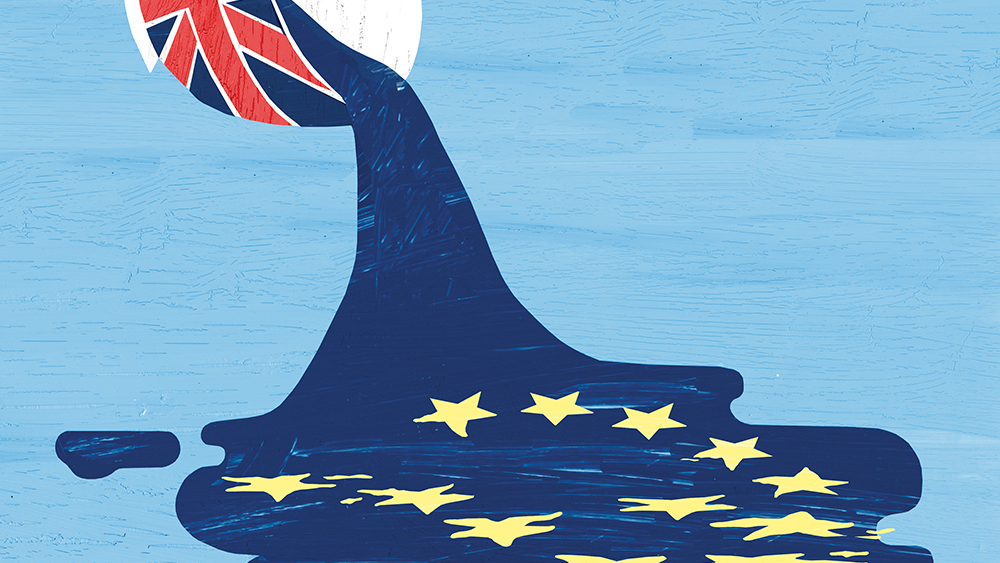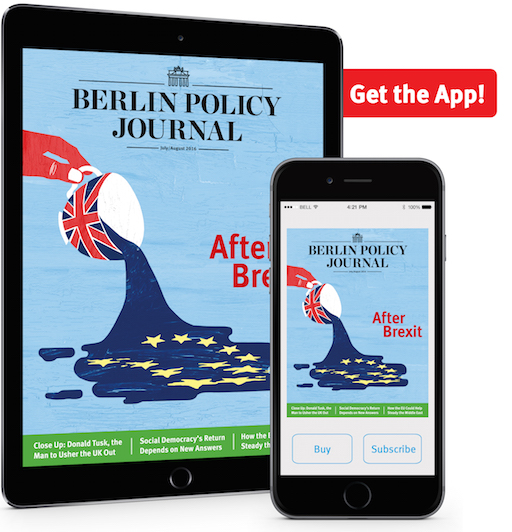While “Breversal” – a reversal of Britain’s June 23 referendum – is not impossible, the likeliest outcome is that the United Kingdom will exit the EU one way or other. What does this mean for Berlin, Paris, and Warsaw?
The Servant Leader
A European Union without Britain demands a new kind of balancing act from Germany.
The United Kingdom’s decision to leave the European Union has catapulted Germany to the next stage of its post-World War II existence: that of the neo-Bismarckian balancer. With the departure of Britain, the traditional outside balancer of continental affairs, much of the balancing within the EU will be left to the big country in the middle: balancing between northern and southern mentalities in economics; balancing between free traders and protectionists; balancing between East and West; and balancing between those who are tough on security and those who don’t feel threatened.
Germany is roughly in the middle on all of these issues, but balancing means more than just finding reasonable middle ground. It means building alliances and accommodating those whose worldview does not prevail in the compromises of the day. The balancing act Berlin will have to perform without the help of the open-market, free-trade, militarily robust, naturally globalist Anglo-Saxons will be a daunting task. It will be more than the country has had to face since it became fully sovereign in 1990 – or since the beginning of the European integration process, for that matter. What does this mean in concrete terms?
Over the next five to ten years, the EU will need at least three decisive reforms. First, and most crucially, it needs to create some sort of fiscal (read: political) union in the eurozone if the common currency is to survive. Secondly, as this will almost inevitably lead to two-speed (read: two-class) Europe, a politically acceptable and practically workable arrangement for an EU divided into euro countries and non-euro countries needs to be found. Thirdly, the EU, or at least the refurbished eurozone, will need to democratize so that citizens feel that they have a say in decision-making at the most integrated level. All of these are long-term reforms, but clear signals need to be sent soon. In addition, an urgent short-term issue looms large on the horizon: finding a workable compromise on refugees that includes improved EU border controls, a shared asylum system among Schengen countries, a system that allows unwilling countries to buy themselves out of their quota, and beefed-up relations with the countries of origin.
Unfortunately, Chancellor Angela Merkel has been wavering on the eurozone. Shortly before the British referendum she said it was “unavoidable” that the eurozone would develop into some sort of political union. Shortly after the Brexit vote she announced that it was not the right time to deepen the eurozone. While this is not exactly contradictory, it is confused messaging – the opposite of the finely tuned EU diplomacy that will now be in demand.
Just as important as action on the euro will be an urgently needed shift in German mentality. Germany will need to become the EU’s “servant leader”, creating acceptance for its outsize influence by visibly defending the common good of the EU, sacrificing some of its own immediate diplomatic gains if necessary. Germany needs to become Europe’s integrationist reserve power again, willing to compromise just a little earlier and pay just a little more than everyone else so that the whole thing can thrive.
Since the late Kohl era, and increasingly so under Chancellors Gerhard Schröder and Merkel herself, Germany had abandoned this position. This needs to be reversed. Naturally, there is no way back to the good old days. Being Europe’s reserve power today means something different from thirty years ago; it is far more demanding. But being the servant leader of Europe is a natural outflow of Germany’s size, geography, history – and own national interest. Bismarck would have understood.
– BY JAN TECHAU
Putting Down a Marker
France will push Britain for a quick exit, hoping to regain greater parity with Germany.
French President François Hollande’s reaction to the news that the British had opted for Brexit was swift: Immediately after the official result was known, Hollande declared that now was the time to act – and act fast. The view from Paris is clear: A quick departure from the European Union is meant to create a warning – pour encourager les autres, as they say in England.
This message is addressed not only to EU member states eyeing an exit themselves or those mulling the idea of threating to leave in order to secure preferential treatment. It is also – and in particular – aimed at Hollande’s domestic audience: there will be presidential elections in France in less than ten months. The election campaign will start right after the summer break, and the Socialist, who is likely to run for a second term, knows how dangerous “Europe” can become as a topic. His Socialist Party (PS) is deeply divided on the issue, still reeling from the trauma of the lost referendum of 2005. In the run-up to that vote, the French political parties tore into each other and themselves; the PS has since been unable to agree on a European line. Hollande will do everything to keep this Pandora’s box tightly shut this time.
One way or another, however, European policy will pop up in the election campaign – directly and through issues like the economy, security, counter-terrorism, identity, and migration. And Brexit will hang over all the debates. Politicians from the right are already demanding a referendum on the future of the EU, among them former President Nicolas Sarkozy, who wants to rebuild the European project and hold a EU-wide referendum to validate this.
Then there are radical parties of the left and right which denounce the “German Europe” of today and demand and “end to austerity.” The leader of the Front National (FN), Marine Le Pen, is wellplaced to enter the final round of elections and has been dreaming of a referendum along the lines of the UK vote. According to several polls, about a third of the French – and three quarters of FN voters – agree with her. Those numbers are too low to lead to “Frexit”, but they are also too high to be ignored. This will likely mean that criticism of the EU will grow, even among politicians in “mainstream” parties.
To win over some of the malcontents, Hollande is trying to use Brexit to put the EU on a different course. His promise of “a different Europe,” on which he campaigned in 2012, was left unrealized. Now he senses another chance – and he is already demanding closer cooperation in security and defense policy, and, as in 2012, increased investment to promote growth and job creation, along with a harmonization of Europe’s fiscal policy regime. This is not least to strengthen France’s role in Europe – and regain greater parity in the German-French tandem power relationship. And Berlin might not mind: Brexit has weakened the traditional “motor” of European integration, removing London as an impetus for greater German-French cooperation. With London out, it is hard to see how the Franco-German axis could facilitate a change of course for the EU without at least some realignment given the differences in their interests and priorities. – BY CLAIRE DEMESMAY
Loss of an Ally
Poland sees its position strengthened in that the European Union needs “adaptation”.
With the United Kingdom gone, Poland and its Law and Justice (PiS) government will lose its favorite ally within the EU. After all, the UK is a country that shares the PiS’ opposition toward further integration, wants to defend its national sovereignty, and rejects the EU common currency.
When the UK leaves, Poland will become the largest country of the non-euro bloc in the EU – though the entire bloc combined will make up just 14 percent of the EU’s economic output, something that will further weaken Warsaw’s bargaining position when it comes to relations between eurozone outs and ins.
But as far as Warsaw is concerned, the most immediate issue to be addressed in the upcoming exit negotiations with the UK will be the status of around 700,000 Polish citizens living and working in the UK. According to current regulations, around half of them would lose their right to stay in the UK once Brexit becomes a reality. Large numbers of Polish migrants returning to Poland would aggravate the domestic labor market and become a source of social and political tension. When the referendum results were announced, Polish officials maintained that securing the rights of these Polish citizens would be the Polish governmentʼs most important goal.
Given the political capital and emotion that have been invested into the Polish-British relationship in recent months, Poland will belong to the group of countries striving for a compromise-oriented approach to the exit negotiations as it seeks to “restore an as-close-as-possible relationship” with the UK, as the government put it. It remains unclear whether this indicates an openness towards a “special deal” with the UK (outside of the obvious options of EEA or WTO membership, or an European Free Trade Association), but Warsaw would be unlikely to make the UK’s Brexit wounds any more painful than necessary and would seek to be flexible in the negotiations on all issues but migration.
Most importantly, however, Brexit serves as a confirmation of the Polish government’s assessment of the EU as a project in need of a substantial “adaptation”. Speaking after the referendum, Jarosław Kaczyński, the leader of PiS, stressed the necessity of a “reform of the EU, which would be also an offer for the UK.”
Such a reform – based on treaty change – should include, according to Kaczyński, a clarification of EU competencies, a strengthening of the subsidiarity principle, and the “widening of unanimity voting.” After the results were announced, Polish President Andrzej Duda wondered aloud whether “the EU does not impose too much on the member states.” In other words: the vote for Brexit is seen as one against the idea of a federalist Europe and an “ever closer union,” rather than an outcome brought about by domestic developments in the UK. This narrative reinforces the Polish government’s approach to the EU.
In the past weeks and months, Warsaw promoted its reform ideas on the back of David Cameron’s February 2016 “deal” – Deputy Foreign Minister Konrad Szymański, in charge of European affairs, called it a “pilot project” that might push the EU “in the right direction and to the right issues.” Cameron’s deal is no longer valid, but its philosophy corresponds with mainstream thinking in Warsaw. In Warsaw’s opinion, a new political contract for Europe would be based on the ideas of flexibility, differentiation, and equal treatment of all EU member states, regardless of their individual levels of integration. Each EU member state should be allowed to define its own integration path – it would be a “multipolar union,” as opposed to a Kerneuropa or European federation.
It remains to be seen how much energy and political capital Warsaw will be ready to invest into translating these ideas into a political initiative. But however much Brexit poses a strategic challenge for the Polish government, it may also create momentum for the Europe á la carte favored today by Warsaw. – BY PIOTR BURAS
Read more in the Berlin Policy Journal App – July/August 2016 issue.








